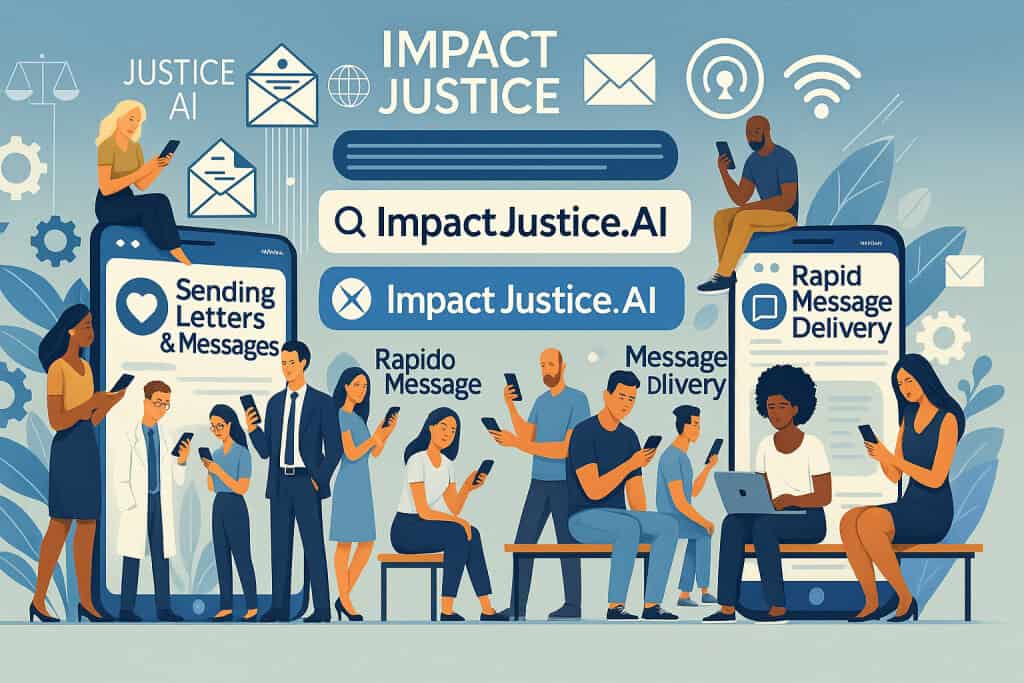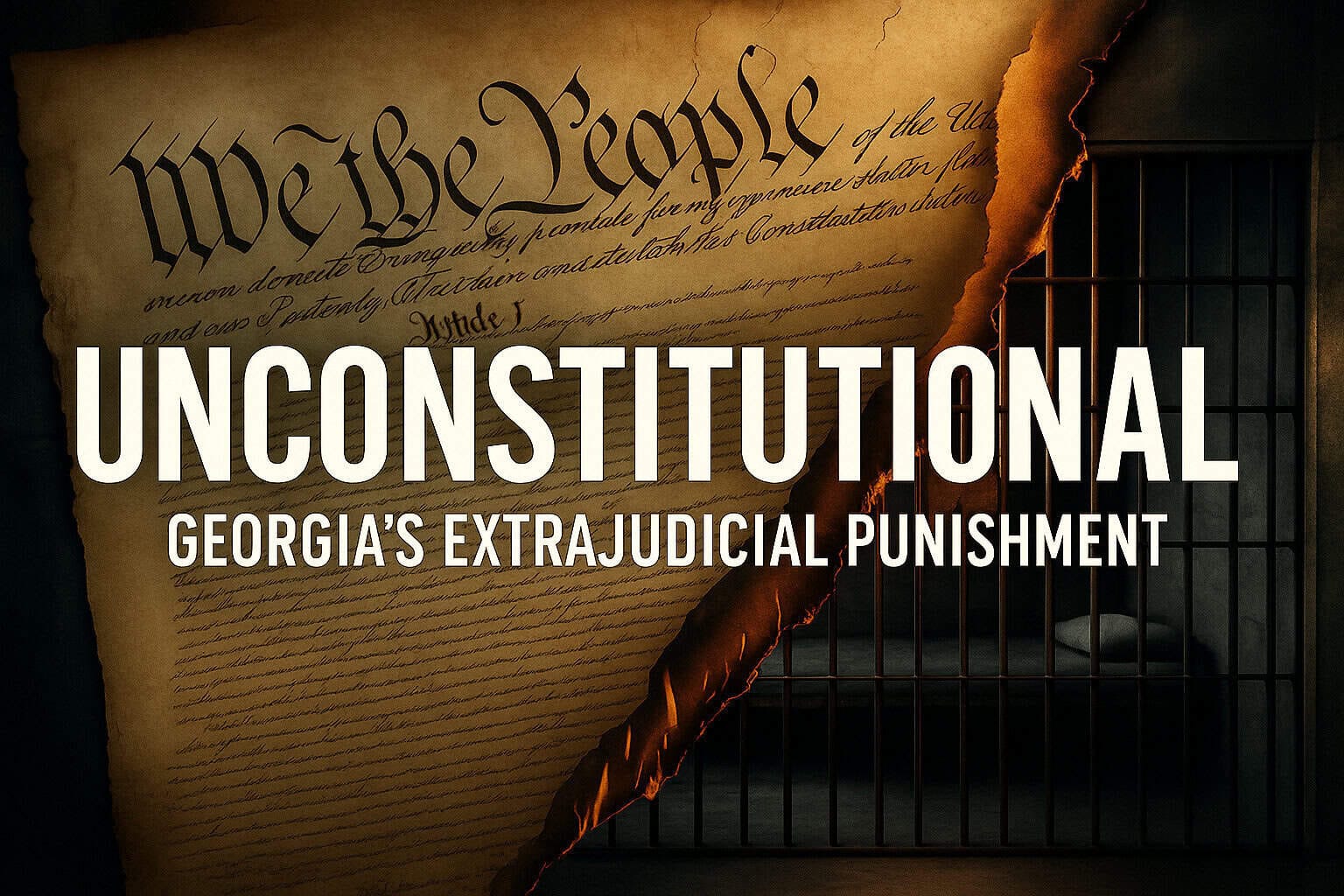When a judge imposes a prison sentence in Georgia, the expectation is clear: the individual will serve their time in a secure facility, under conditions that meet constitutional standards. The sentence, whether five years or fifty, is supposed to be finite, proportionate, and legally bounded. But for thousands of Georgians behind bars, the sentence handed down in court bears little resemblance to the punishment being carried out in practice.
Thanks to a broken, violent, and medically negligent prison system, the actual punishment has become far more extreme—and in many cases, far more dangerous—than what any judge imposed.
“The sentence imposed is not the sentence being served.”
That statement, submitted by GPS contributor Kye Fischer1, captures the core truth behind Georgia’s prison crisis. It’s not about abstract legal theory—it’s about daily survival. The U.S. Department of Justice has confirmed that Georgia’s Department of Corrections (GDC) systematically violates the constitutional rights of prisoners. In its 2024 report, the DOJ documented over 140 homicides in five years, rampant gang control, widespread sexual assault, staff vacancy rates as high as 70%, and routine denial of medical care. This is not incarceration—it’s abandonment to chaos.
A Constitutional Breach
The Eighth Amendment to the U.S. Constitution prohibits cruel and unusual punishment. Courts have long held that this includes not just overt abuse, but also conditions that result in violence, untreated illness, or psychological torment. In Estelle v. Gamble2, the Supreme Court ruled that deliberate indifference to serious medical needs constitutes cruel and unusual punishment. In Farmer v. Brennan3, the Court extended that protection to conditions of confinement. And in Brown v. Plata4, a federal court ordered mass prisoner releases in California when conditions became irreparably unconstitutional.
Georgia has surpassed the threshold laid out in those cases.
So what happens when the state imposes a ten-year sentence, but carries it out in a place where survival itself is uncertain? What do we call it when a person sentenced to time becomes a person sentenced to trauma, injury, or death?
We call it a violation of the law. We call it a moral failure. And we must call it what it is: a sentence that has become illegal in its execution.
The Real-Time Enhancement of Sentences
When a person is forced to serve their sentence in conditions so dangerous that they are assaulted, extorted, stabbed, denied care, or psychologically destroyed, then their actual punishment is far greater than the original sentence.
A ten-year sentence in a functional system is ten years.
A ten-year sentence in the GDC is trauma that lasts a lifetime—if the person survives it.
That is not justice. That is not rehabilitation. That is extrajudicial punishment.
No Relief from the Governor
Unlike many other states, Georgia’s governor has no power to parole or commute sentences. That power rests solely with the State Board of Pardons and Paroles—an unelected body composed entirely of individuals with law enforcement or prosecutorial backgrounds.
This creates a crisis of accountability. When the system breaks down, there is no direct democratic mechanism to correct it. The courts and the legislature are the only remaining checks on the GDC’s unchecked power.
The Case for Legislative Intervention
While the current General Assembly has shown little appetite for reform, the constitutional and moral violations inside Georgia’s prisons demand legislative action. Lawmakers have the power to:
- Enact population-reduction strategies, such as presumptive parole or sentence credits.
- Expand parole eligibility for elderly, infirm, and nonviolent prisoners.
- Create emergency release authority for extreme systemic failure.
- Mandate federal oversight or invite DOJ monitors.
To date, they have done none of these things.
A Moral Obligation
This is not a question of being soft on crime. It’s a question of whether the state itself is following the law. The people of Georgia never voted to sentence individuals to death by neglect, assault by gang members, or years of untreated medical illness. Yet that is what the GDC is delivering every day.
If Georgia cannot safely carry out the sentences it imposes, then it must stop imposing them. Or reduce them. Or release those it cannot protect.
Judges must recognize this reality when sentencing or reviewing motions. Defense attorneys must argue that the punishment exceeds what the law allows. And the public must stop pretending this is just a bureaucratic failure—it is a human rights crisis.
“Justice doesn’t end with sentencing. It is defined by how we carry out that sentence—and whether we still see the humanity of those who are incarcerated.”
We must ask: when a person serves more trauma than time, when survival eclipses rehabilitation, when the sentence imposed is no longer the sentence being served—has the state broken its contract with justice?
Yes!! And it’s time to repair it.
What You Can Do
This crisis won’t fix itself—and silence only guarantees more suffering. You have the power to raise your voice and demand change.
- Use ImpactJustice.AI to instantly send targeted messages to Georgia lawmakers, media outlets, and decision-makers. The system helps you craft impactful, evidence-based letters in seconds.
- Call and write your state legislators. Ask them what they’re doing to reduce Georgia’s prison population and ensure humane conditions. Demand oversight, transparency, and real decarceration solutions.
- Share this article and speak publicly about what’s happening. Awareness is the first step toward action.
Further Reading on How We Fix This
• 🔗 A Second Chance for Georgia: Fixing Parole With the Reform It Desperately Needs
Advocates for a stronger, enforceable parole system to prevent prolonged, unnecessary incarceration.
• 🔗 Fixing Georgia’s Parole System: The Ultimate Plan for Justice
Lays out the flaws in Georgia’s current parole process and proposes bold reforms.
• 🔗 A Simple Message for the GDC
Offers a framework for reducing prison violence through population reduction and transparency.
• 🔗 In and Out: The Lives Destroyed by the GDC
Explores how cycles of incarceration are fueled by hopelessness, lack of rehabilitation, and poor conditions.


- Thanks to Kye Fischer for inspiring this article.
[↩]
- Estelle v. Gamble (1976): Held that deliberate indifference to serious medical needs of prisoners violates the Eighth Amendment. https://www.law.cornell.edu/supremecourt/text/429/97[↩]
- Farmer v. Brennan (1994): Established that prison officials who show deliberate indifference to a substantial risk of serious harm violate the Eighth Amendment. https://supreme.justia.com/cases/federal/us/511/825/[↩]
- Brown v. Plata (2011): Upheld a federal order requiring California to reduce its prison population due to systemic constitutional violations. https://www.law.cornell.edu/supct/html/09-1233.ZS.html[↩]

1 thought on “Unconstitutional: Georgia’s Extrajudicial Punishment”